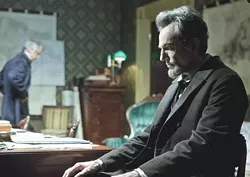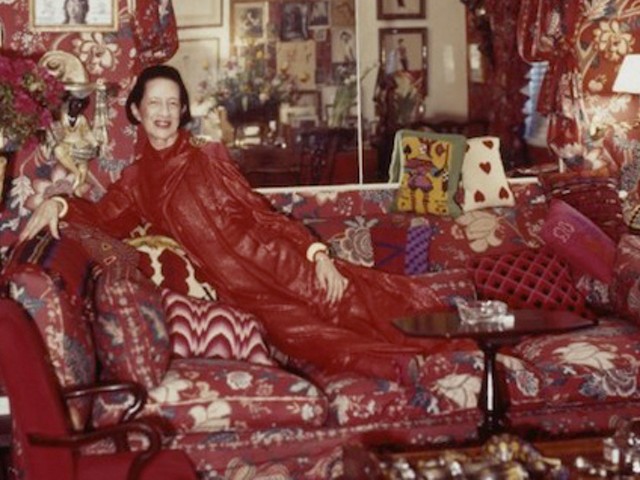Lincoln | B+
There's a perfect final shot in Steven Spielberg's Lincoln, in which the celebrated 16th president stands silhouetted in the doorway of the White House, late to join his wife at Ford's Theatre. The image is gorgeously composed and emotionally stirring, hailing the quiet but dogged humanity of "Honest Abe" yet tinged with just the right amount of foreboding. History has taught us what happens next.
Unfortunately, Spielberg — true to his baser instincts — runs his film for another 10 minutes, taking us through that fateful night (albeit without actually showing the assassination), then doubling down with a final rousing speech, Lincoln's Second Inaugural. Surprisingly, it's one of only a few artistic lapses in an otherwise handsome and discriminating historical drama.
What'll be interesting to see is whether Spielberg's reputation for grandiose set pieces and shameless emotional button-pushing will attract robust audiences for a restrained, two-and-a-half-hour period piece that focuses on the true spirit of politics: speechifying, extortion, lobbying and ego. Don't let the battle scenes in the trailers fool you, Lincoln is less about rifles and cannons and more about dandified lawyers and crotchety politicians in powdered wigs pounding the desk, adjusting their waistcoats, and hurling old-timey insults at one another. In other words, Spielberg is revisiting his Amistad days, only with a lot less bluster and sanctimony.
Written by playwright Tony Kushner and using portions of Doris Kearns Goodwin's 2005 biography Team of Rivals, the film is set in 1865, during the final months of the Civil War. Lincoln (played by Daniel Day-Lewis) recognizes that he has only a small window of opportunity in which to pass the 13th Amendment abolishing slavery. It is explained that his Emancipation Proclamation was a war powers act, which not only brought with it limited enforcement (it didn't apply to border states) but also would, ironically, legitimize the Confederacy's claim that slaves are property. Should the war end without the 13th becoming law, it is unlikely that the highly partisan and constipated Congress would ever allow its final passage. What ensues is a game of political manipulation, horse-trading, bullying and bribery, where Lincoln must unite the interests of radicals and conservatives in his own Republican Party while picking off a few of the oppositional Democrats — all while secretly delaying a treaty with the South to end the bloodshed. A risky proposition given that the House had rejected the amendment less than a year earlier and the country was profoundly weary of war.
Things kick off slowly as Lincoln carefully lays its narrative footings with background history, a long list of characters, and finely honed exposition. Truth be told, it feels a bit like a mega-budgeted episode of Masterpiece Theater, as the plan to end slavery becomes an elaborate and messy political puzzle that accents just how untidy democracy can be. It depicts a particularly fractious time in America history, when our government was very much a work in progress (as it remains to this day). But this isn't a dry civic lesson. History comes alive (to indulge in cliché) as Kushner's script revels in the nuances of rhetoric and the sport of power. The men of the 39th Congress embody high principles and base instincts, wrestling with their loyalty to party, conscience and personal fortune. Some are sincere, others connive, and a not insignificant number are fools, unworthy of the offices they hold. It demonstrates how little the character of the House has changed over the last century and a half, and parallels to the battle over "Obamacare" can be seen in its subtext.
Where things have notably changed, however, is in the use of language. Spirited debates, flowery oratory, and homespun parables blossom throughout the movie, and it's a pleasure to play spectator to Kushner's rich dialogue. "Oh, the joys of being comprehended," Lincoln states, and it's hard not to agree. This is a movie that embraces the fullness of English eloquence and dares the audience to keep up.
Spielberg's film is similarly triumphant in its casting. John Hawkes, Tim Blake Nelson and a wonderfully pudgy James Spader play a trio of delightfully amoral lobbyists. As Lincoln's Secretary of State William Seward, David Strathairn brings a watchful gravity to the proceedings, and Jared Harris makes for a well-worn Ulysses S. Grant. Even minor characters benefit from the talents of Hal Holbrook, Lee Pace and Jackie Earle Haley. And though playing the cantankerous, radical Republican Thaddeus Stevens may seem like old hat for Tommy Lee Jones, his singular mix of thunder, humor, pride and moral decency will inevitably attract Oscar notice.
Which leaves us with Daniel Day-Lewis. Putting aside the remarkable physical likeness, Lewis's portrait of Lincoln is both modestly grounded and masterfully complex. His shoulders are stooped, his smile warm and weary, and his voice is both higher pitched and more timorous than we might expect. But the tenderness and melancholy, no doubt authentic to Lincoln's character, hide the great president's droll sense of humor, razor-sharp intelligence and cunning instincts. To some, he is a gentle and affable man who is given to homespun anecdotes that pack a metaphorical punch. To others, he is a shrewd and seasoned lawyer who knows how to wield the power of his personality and office. Lewis shows that he needs neither bluster nor gimmicks (as he is sometimes given to indulge in) to command the screen.
And yet, despite this, Lincoln remains an emotionally detached experience. The movie doesn't really give us any insight into who the president was as a man, but it does give us a sense of what it might have been like to be around him. Perhaps sensing this, Spielberg insists on inserting some family drama, with Abe's son Robert (Joseph Gordon-Levitt) insisting that he be permitted to join the war, and Sally Field's Mary Todd fretting and frothing that she won't lose another child. It's hokey, distracting and dramatically ineffectual stuff and, frankly, unnecessarily cheapens Field's performance and character. How much better would have Lincoln been if Mary Todd were treated as another rival (albeit an emotional one) to be enlisted into Lincoln's cause rather than an underwritten stereotype of history? How much more would we learn of the man, had his wife provided a space where his personal doubts and fears could be expressed?
In the end, Lincoln demonstrates that history is made by ordinary people, and that true leadership is the ability to overcome the drama of the moment in order to fulfill the wisdom of time. Spielberg's film illustrates how both Abraham Lincoln and members of Congress overcame the former in service of the latter.
It is a lesson in duty and compromise that both the American electorate and its elected representatives would do well to learn.






